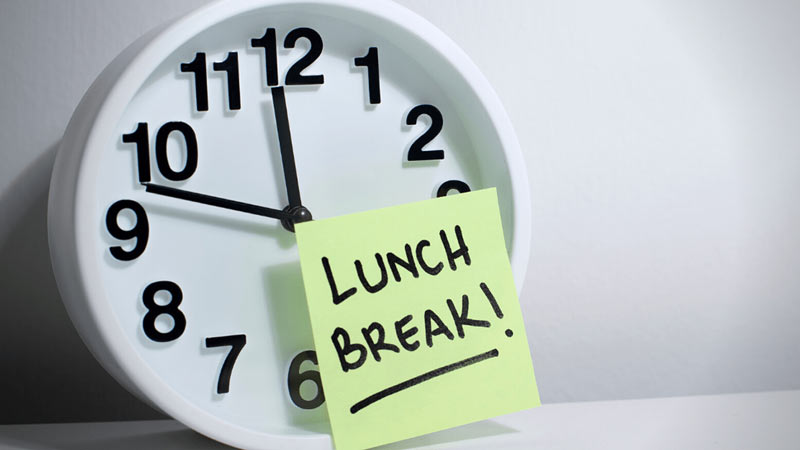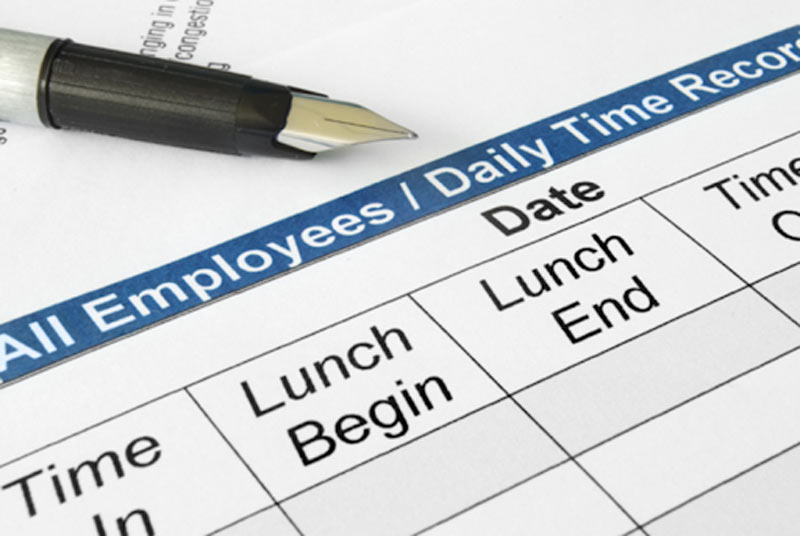California is renowned for having some of the most generous meal and rest break laws in the U.S. These laws emphasize that employers must provide their employees with sufficient time for rest and meals during their shifts, regardless of whether they are paid for this time. Normally, employees are entitled to a 30-minute meal break for every five hours of work. However, these regulations can also be intricate and perplexing, as they can vary based on the nature and duration of the work. Whether you're an employer or an employee in California, understanding and adhering to California's lunch break laws is crucial.
In California, meal break requirements for non-exempt employees are governed by California Labor Code Section 512 and the California Industrial Welfare Commission (IWC) Wage Orders. These regulations require that employees who work more than five hours a day are legally entitled to a meal break of at least 30 minutes, starting before the end of the fifth hour of work (unless the total work period is six hours or less and the meal period is waived by mutual consent).
For working shifts lasting more than ten hours, aside from receiving overtime pay, employees can get a second 30-minute meal break, which should start no later than the end of the employee's tenth hour of work (unless the total work period is 12 hours or less and the second meal period is waived by mutual consent, except in certain industries).
Any failure to provide a required meal break results in the employer owing the employee one additional hour of pay at the regular labor rate for each workday that the meal break is not provided, as per California Labor Code Section 226.7.

Here is the table of Ca labor lunch requirement:
Shift Length | Meal Break Requirement | Timing of Meal Break | Penalty for Non-Compliance |
More than 5 hours, up to 10 hours | 30-minute meal break | Before end of 5th hour | One additional hour of pay |
More than 10 hours, up to 12 hours | Second 30-minute meal break | Before end of 10th hour | One additional hour of pay
|
The chart of California lunch break rules
For example, Sarah works as a cashier at a retail store in California. Her shift is scheduled from 9:00 a.m. to 5:30 p.m., with a 30-minute meal period. According to California labor laws, since Sarah's working shift is more than five hours, she is entitled to a California mandatory lunch break. Her lunch period should start before the end of her fifth hour of work, which would be no later than 2:00 PM.
If Sarah's shift is extended, say from 9:00 AM to 6:30 PM, she would be entitled to a second 30-minute meal break, which should start before the end of her tenth hour of work, which would be no later than 4:00 PM. If Sarah's boss fails to provide her with the above meal breaks, they would be required to pay her one additional hour of pay at her regular labor rate for each workday that the meal break is not provided.
Most nonexempt employees, who are typically paid weekly, are entitled to rest and meal breaks as mandated by California labor laws. However, there are exceptions to these rules, particularly for exempt employees who are not entitled to rest breaks but are entitled to meal breaks. Exempt employees must meet specific criteria to be exempt from these break requirements:
Certain types of workers have different rest and meal break laws. For example, domestic employees and farm employees have their own regulations. Additionally, employees who work outdoors are entitled to take a cool-off break in the shade whenever necessary to protect themselves from heat illness.
These regulations exempt independent contractors and certain healthcare industry workers from the specified break laws. Additionally, in specific unionized sectors with collective bargaining agreements establishing alternative schedules, the meal break requirements may not be applicable. Examples of such industries include construction, commercial drivers, security officers, and workers in movies and motion pictures, as well as employees of electrical or gas companies.
In California, meal breaks must be taken according to specific rules:

These rules are designed to ensure that employees have adequate time for meals during their workday, promoting their health and well-being. It's important for employers to adhere to these rules to avoid potential legal issues.
Employers in California are required to adhere to specific break laws to ensure they are compliant with state regulations. Here are the key responsibilities employers have in relation to California break laws:
Meal Breaks
Rest Breaks
On-Duty Meal Periods
Record Keeping
Enforcement
Consequences of Non-Compliance
Education and Training
Employers should educate and train supervisors and managers in California to break laws to ensure compliance.
Employee Rights
Employers must inform employees of their rights to meal and rest breaks under California law.
Violating California lunch break laws can have strictly serious consequences for employers, including penalties and potential legal action by employees. Here are some of the consequences for violating California lunch break laws:
Penalties
Employers may be required to pay one additional hour of pay at the employee's regular rate for each workday that a meal break is not provided. This penalty is known as "meal period premium pay" and is meant to compensate employees for the missed meal break.
Class Action Lawsuits
Employees may file class action lawsuits against employers for failing to provide compliant meal breaks. Class action lawsuits are typically based on allegations that the employer failed to provide meal breaks as required by California law. The lawsuit may claim that the employer's policies or practices systematically denied employees their rights to meal breaks.
Civil Penalties
In addition to meal period premium pay, employers may be subject to civil penalties for violating California lunch break laws.
Reputation Damage
Violating California lunch break laws can damage an employer's reputation and lead to negative publicity.
Timing of Rest Breaks
Employees are entitled to a 10-minute paid rest break for every 4 hours worked or a major fraction thereof. A major fraction is defined as any amount of time greater than two hours. For example:
Paid Breaks
Rest breaks are considered paid time, and employees must be fully relieved of their duties during these breaks.
Scheduling of Rest Breaks
Employers should make a good faith effort to authorize and permit rest breaks in the middle of each work period. However, if this is not practical, employers should schedule breaks as close to the middle of the work period as possible.
Missed Rest Breaks
If an employer fails to provide a required rest break, the employer must pay the employee one additional hour of pay at the employee's regular rate for each workday that the rest break is not provided.
Nature of Work Exceptions
There are limited exceptions where the nature of the work prevents an employee from being relieved of all duty during a rest break. For example, if there is only one employee on duty at a retail store, the employee may be unable to take a full rest break. However, these exceptions are narrowly construed and must be justified by the employer.
Recordkeeping
Employers must maintain accurate records of rest breaks provided to employees.
Enforcement: The California Labor Commissioner's Office enforces rest break requirements, and employees have the right to file a complaint if they believe their rest break rights have been violated.
Shift Length | Paid 10-Minute Rest Breaks | Unpaid 30-Minute Meal Breaks |
Less than 3.5 Hours | 0 | 0 |
3.5–5 Hours | 1 | 0 |
5.1–6 Hours | 1 | 1 (Can be waived by mutual consent) |
6.1–10 Hours | 2 | 1 |
10.1–14 Hours | 3 | 2 |
14+ Hours | At Least 4 | 2 (Only one of these meal breaks can be waived, and even then only if the employee works less than 12 hours) |
Meal and rest break chart
Here are some tips for employees to ensure they legally get their meal breaks:
Can I work 6 hours without having a lunch break in California?
No, if you work 6 hours in California, you are entitled to a meal break of at least 30 minutes, unless you and your employer mutually agree to waive the meal break.
What is the law for breaks and lunches in California in 2024?
In California in 2024, employees are entitled to a 10-minute rest break for every 4 hours worked and a meal break of at least 30 minutes for every 5 hours worked, with specific requirements based on the total length of the shift.
What is California's 5-hour lunch rule?
California's meal break rule requires that employees who work more than 5 hours a day be provided with a meal break of at least 30 minutes. This break must be uninterrupted, and employees must be relieved of all duties during this time.
Can I waive my lunch break in California?
Yes, you can waive your meal break in California if you work no more than 6 hours a day. Both you and your employer must agree to waive the meal break voluntarily. If you work more than 6 hours, you cannot waive your meal break.
How many breaks do I get in an 8-hour working shift in California?
In an 8-hour shift in California, you are entitled to two 10-minute rest breaks and one 30-minute meal break. The first rest break should be taken in the middle of the work period, and the second rest break should be taken as close to the middle of the second 4-hour period as possible.
In conclusion, California lunch break laws are designed to protect employees' rights and ensure they receive adequate meal and rest breaks during their workday. It's important for both employers and employees to understand these laws to prevent violations and ensure a fair and healthy work environment.